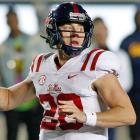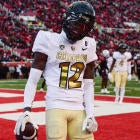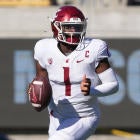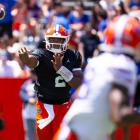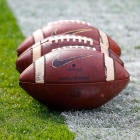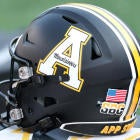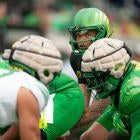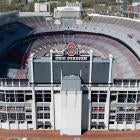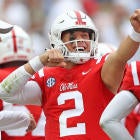Former Ole Miss quarterback Shea Patterson will, in fact, be immediately eligible to play for Michigan this season. The university made the announcement on Friday in a joint statement with Ole Miss citing the NCAA Division I Council's recent amendment to transfer waiver guidelines.
IT’S OFFICIAL: @SheaPatterson_1 is eligible for 2018-19!
— Michigan Football (@UMichFootball) April 27, 2018
RELEASE » https://t.co/QSezPV3oJZ #GoBlue 〽️🏈 pic.twitter.com/nbi3zmsBdQ
"Following notification of this change, the University of Mississippi promptly reached out to the University of Michigan, to discuss how these new standards could impact the University of Mississippi's support of a transfer student-athlete's desire to compete immediately at the University of Michigan," the statement read. "The University of Mississippi and the University of Michigan have worked together over the last several days in conjunction with the NCAA national office staff, and with a focus on the best interest of the student-athlete, to put forward a new waiver application. That new application was submitted this week by the University of Michigan and supported by both schools. The University of Michigan has withdrawn its previous waiver application and all associated materials in favor of this new, cooperative approach based on facts which all parties agree to. The waiver has now been approved by the NCAA and thus football student-athlete Shea Patterson will be eligible to compete in the 2018-19 academic year.
"Both schools are ready to move forward and appreciate the assistance of the NCAA staff in bringing this matter to a resolution," the statement continued. "While the process has been complex at times, the solution was simple -- two flagship universities and the NCAA staff working together with a focus on student-athlete well-being."
Of course, calling the process "complex" is a bit of an understatement. CBS Sports' Dennis Dodd reported on Thursday that Patterson was expected to be granted immediate eligibility following an exhausting battle involving both schools and the NCAA. At the heart of the situation was Patterson's intent to transfer because he felt he was misled by the school and former coach Hugh Freeze about Ole Miss' NCAA scandal. And, of course, Ole Miss objected with Patterson's assessment. While Patterson was not the only Ole Miss player to seek transfer in the wake of the NCAA's sanctions, he was the most high profile for that very reason.
In the end, though, there was an easy solution: for everyone to move on. The Rebels could have either supported Patterson's transfer waiver or simply not objected to it. Regardless of how it went down behind the scenes, bickering over transfers and eligibility usually only has one acceptable outcome, which is to let the player do what he wants and let it go.
"The objective here was to get a ruling that would allow Shea to play for Michigan this fall. I couldn't care less what section of the NCAA rules were used to reach this result," Patterson's attorney, Tom Mars, told Dodd. "The NCAA could have used a Ouija Board to reach that decision, and we wouldn't have complained."
"There are a lot of people who worked really hard to help make this transfer process a success," Patterson said in a statement released through Michigan. "I want to thank Coach (Jim) Harbaugh, the University of Michigan and the NCAA for allowing me to continue my education and football career at one of the best universities in the country.
"A special thanks to Michigan's Compliance Staff and to Tom Mars for his personal guidance for me and my family during this time. With this decision behind us, my family and I are fully focused on the upcoming season. My teammates and I are always committed to competing at the highest level and winning championships. Go Blue!"
With the news, Patterson should immediately be one of the frontrunners to win the Wolverines' quarterback job this upcoming season. As a sophomore in 2017, Patterson through for 2,259 yards, 17 touchdowns and nine picks.












